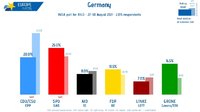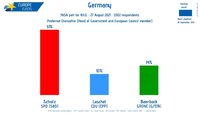- Член од
- 13 јули 2006
- Мислења
- 15.167
- Поени од реакции
- 17.966
Браво бе Орбан, алал да ти е. Се надевам и Бугариве ќе истрајат. Мочај по Германците и Холанѓаните 
Од Будимпешта повторно стигнуваат остри обвинувања на сметка на Европската Унија и решително противење на создавањето „европско царство“. Покрај тоа, се бара и Србија да стане членка на Европската Унија, пренесува загрепски Вечерњи лист кој ги објави седумте унгарски предлози.
- Во Брисел градат таква супердржава за која никој не дал овластување. Ние му велиме „не“ на европското царство.
- Интеграцијата е средство, а не цел сама по себе. Од Основните договори на ЕУ треба да се избрише поставувањето на целта „сè потесно поврзани унии меѓу народите на Европа“.
- Одлуките нека ги носат избраните лидери, а не меѓународните невладини организации! Велиме „не“ на мешањето од страна во владеењето на правото.
- Силата на европските интеграции ја даваат заедничките економски успеси. Ако заедно не можеме да бидеме поуспешни отколку поединечно, тогаш тоа е крај на Европската Унија.
- Следната деценија ќе биде период на опасни предизвици – нè загрозуваат масовни миграции и пандемии. Мораме да ги заштитиме луѓето во Европа.
- Мораме да ја вратиме европската демократија. Европскиот парламент се покажа како ќорсокак – ги застапува исклучиво сопствените идеолошки и институционални интереси. Потребно е да се зголемат улогите на националните парламенти.
- Србија треба да се прими во членството на Европската Унија.

 www.mkd.mk
www.mkd.mk

Од Будимпешта повторно стигнуваат остри обвинувања на сметка на Европската Унија и решително противење на создавањето „европско царство“. Покрај тоа, се бара и Србија да стане членка на Европската Унија, пренесува загрепски Вечерњи лист кој ги објави седумте унгарски предлози.
- Во Брисел градат таква супердржава за која никој не дал овластување. Ние му велиме „не“ на европското царство.
- Интеграцијата е средство, а не цел сама по себе. Од Основните договори на ЕУ треба да се избрише поставувањето на целта „сè потесно поврзани унии меѓу народите на Европа“.
- Одлуките нека ги носат избраните лидери, а не меѓународните невладини организации! Велиме „не“ на мешањето од страна во владеењето на правото.
- Силата на европските интеграции ја даваат заедничките економски успеси. Ако заедно не можеме да бидеме поуспешни отколку поединечно, тогаш тоа е крај на Европската Унија.
- Следната деценија ќе биде период на опасни предизвици – нè загрозуваат масовни миграции и пандемии. Мораме да ги заштитиме луѓето во Европа.
- Мораме да ја вратиме европската демократија. Европскиот парламент се покажа како ќорсокак – ги застапува исклучиво сопствените идеолошки и институционални интереси. Потребно е да се зголемат улогите на националните парламенти.
- Србија треба да се прими во членството на Европската Унија.

Планот на Орбан во 7 точки кој нема да ѝ се допадне на ЕУ
Владата на унгарскиот премиер Виктор Орбан објави текст во форма на оглас под називот „За иднината на Европската Унија“. Во текстот има седум предлози зад кои стои Унгарија.






